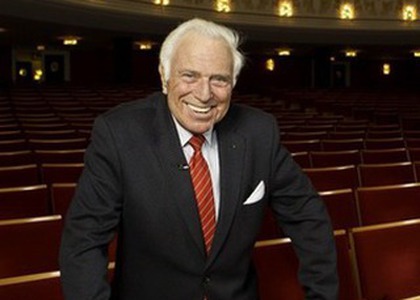> [Archived] Interviews

Ioan Holender about the conference he is to hold at the Romanian Athenaeum
On March 29th, the conference "Music and performance" is being officiated by Ioan Holender, in conversation with Sever Voinescu. The event's musical moments are delivered by soprano Aida Pascu, violinist Valentin Șerban, cellist Ștefan Cazacu and pianist Gabriel Gâțan. More details at https://www.fge.org.ro/calendar.
"Communication patterns found between humans have been overly diverse, since long lost times and until nowadays. When it comes to communication, it has always been there. There has been communication through drawings, paintingsand,going along our civilisation's path, we have developed speech, more precisely communication through speech - the most prevalent way, and yet somehowlimited by our national languages.
An international language does not exist. There has been an attempt at creating one, not long ago, after World War II, the Esperanto language, which was a global one. During those times, I was 10-12 years old. I thought it was a great idea to try Esperanto. You won't need any other language, since everyone speaks the same one. The Communist Party, more exactly the Marxist ideology, was totally opposed to this Esperanto; it had even been forbidden. We learned Russian. Anyway, that's another story.
Therefore, language limits the ways in which one can communicate. It is the action ofwriting, or the letters, which, as you are well acquainted with, ladies and gentlemen, are on the brink of extinction and are being replaced with this horrible email which entails sloppy writing andnumerous errors. Grammar is no longer important, but, oh well, it could be considered another way of communicating in today's time, I would guess.
The other - general, respected, glorified - is singing. By which I mean, you communicate through singing. It is a superior step to speaking and it is the purest, cleanest, it is through your very body, it is dancing. Dancing is the most exalted, the finest communication there is.
Still, I would like to talk about singers, about the opera singer and the theatre actor. To go on stage, to find yourself here, in the heart of this extraordinary oasis of culture, in the Athenaeum, singing, having no instrument, no help apart from your very body, your voice, it is something divine, I would say, without any exaggeration. It is through your very body, through what God gave you and through what you have learned, of course, that you are able to sing, in order to tell a story, to deliver emotions… Singing is absolutely the superior auditory communication. It is only after that the instruments come into the picture. Although, what does singing accomplish? It is mostly aningrate profession, it doesn't last too long, it entails the longest time to comprehend and the shortest to work in. We are going to continuediscussing together with my friend, Sever Voinescu, about these topics and many others."
Translated by Adelina-Maria Mănăilescu,
University of Bucharest, Faculty of Foreign Languages and Literatures, MTTLC, year I
Corrected by Silvia Petrescu














